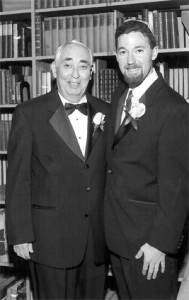 I was intimately struck by a piece of news last week that, although covered by everyone from the New York Times and Washington Post (who first reported the news) is getting far less buzz than the revolution in Egypt, the political hubub in Madison, Wisconsin and who’s going to be the big winner at this year’s Oscar’s.
I was intimately struck by a piece of news last week that, although covered by everyone from the New York Times and Washington Post (who first reported the news) is getting far less buzz than the revolution in Egypt, the political hubub in Madison, Wisconsin and who’s going to be the big winner at this year’s Oscar’s.
It’s a story fraught with huge philosophical and moral consequences.
It’s a proposed change to the way the kidney transplant system works in the United States and, in short, it would start to (for the first time) factor age into the rules that determine which patients on the nation’s kidney transplant list are provided the most sought-after transplant organ.
Says the Times: “patients and kidneys would each be graded, and the healthiest and youngest 20 percent of patients and kidneys would be segregated into a separate pool so that the best kidneys would be given to patients with the longest life expectancies. The remaining 80 percent of patients would be put into a pool from which the network that arranges for organ matches, called the United Network for Organ Sharing, would try to ensure that the age difference between kidney donors and recipients is no more than 15 years.”
Why do I care about this proposal? Â If it had been implemented in the mid-90s, there’s a good chance my father would have died long before he did.
My dad, at a fairly young age, was struck with a kidney disease (the name of which escapes me sadly) that set him on path towards an eventual kidney transplant. Â For years he knew that his kidney function would slowly deteriorate to the point that he eventually began dialysis three times a week. Â If you’ve never known someone someone on dialysis, it robs you of your energy, your zest for daily life. Â And it’s never ending. Â You will be on dialysis until you receive a kidney transplant or until you die.
So on that night in the fall of 1995 when the phone rang at 3 a.m. to tell my father that due to a tragic motorcycle accident in Iowa, it was time to make the drive from Chicago to Milwaukee where a perfectly matched kidney would be awaiting him. Â He was, at the time, in his early sixties and frankly, scared out of his mind. Â We didn’t leave the house for nearly an hour while he and my mom talked through his fears. “I don’t know if I can do this,” he said, visibly scared to me for the first time in my life.
We made the trip, the transplant was a success and he lived long enough to, among other things, see me marry my wife. Â Had he not been diagnosed with lung cancer five years later, who’s to say that he wouldn’t still be here with us? Â But it raises a serious question in light of the new proposed rules: was this the right moral and ethical decision? Â Based on time on a transplant list and quality of the match, was my dad the right person to get this kidney? Â If there had been someone with the same disease he had contracted, the same quality of match, yet 30 years younger, does that individual deserve the kidney more than my father?
From my perspective, I’m clearly biased from my personal life experience. Â Do we know that the 30-year-old will be able to bring better societal contributions purely based on his age and projected lifespan? Â Do we know that because the 30-year-old drives to and from work each day that he will be more likely to be in a car accident than the man in his 60s who doesn’t drive as much? Â Can we quantify the joy brought to any family by whatever time you spend with an individual during the 525,600 minutes they spend on Earth each year?
Whatever you say, one thing’s clear: if more people became organ donors, there’d be less of an issue because more people die each year with kidneys that could save and prolong lives than need them. Â So sign the back of your driver’s license and make that gift to someone when you’re gone. Â You can’t take it with you and I can say hand’s down, having my father at my wedding remains one of my fondest memories of my time with him.
#
Thank you, Adam for addressing this. It totally escaped me when it first appeared in the news, and I’m not sure why. Organ donation is something that is very dear to me as well, for on February 14th, 2009, my father received a heart and a kidney. He needed both, although the kidney was secondary. Had this system been in place, would he have received either? He is in his 60’s, and was not a candidate for what they consider young organs to begin with. Would he even had been on the list with this new system? I don’t know, and I am pained to think that he would not have received these gifts, since he would have been deemed too old.
I understand the need to help the younger patients, but should it be to the detriment of the older? Are they any less deserving? It just seems to be a slippery slope that we shouldn’t start.
Just my two cents. Thanks for the forum to vent.